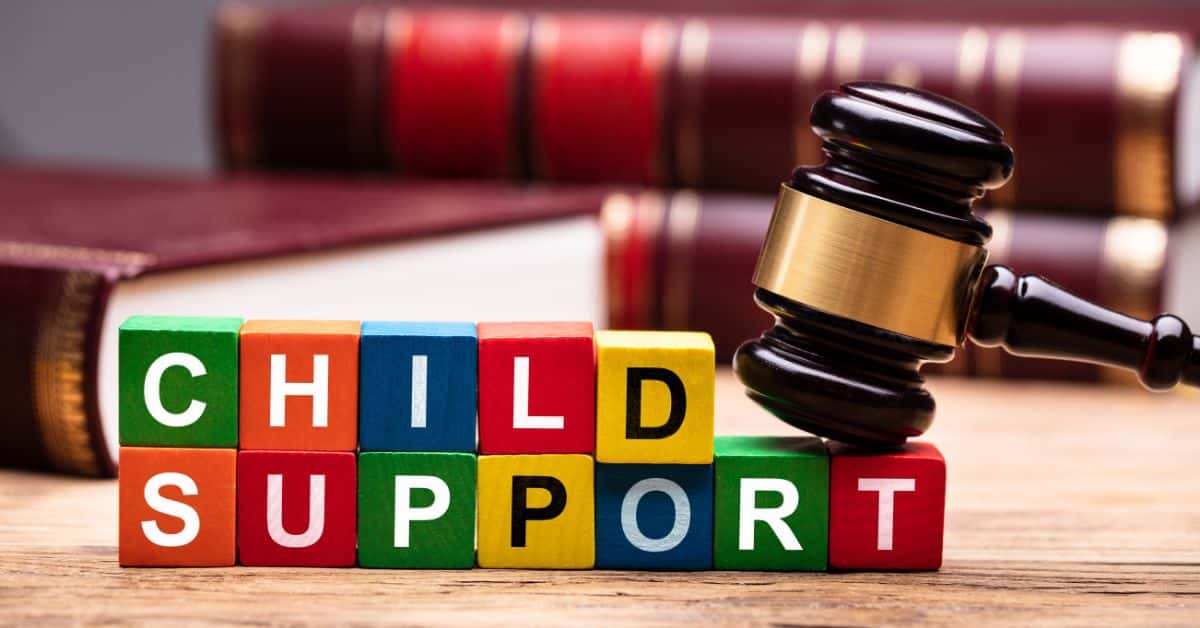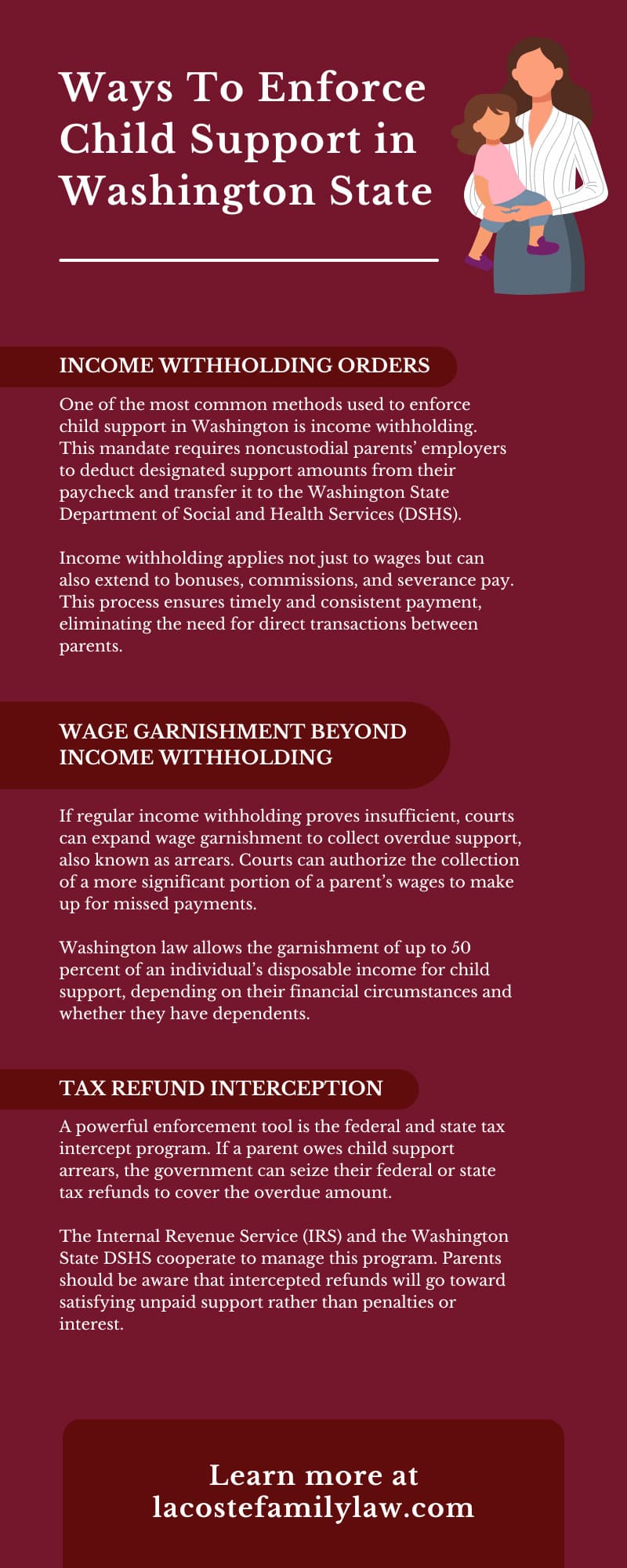
23 Oct 9 Ways To Enforce Child Support in Washington State
Child support agreements are essential so parents can meet a child’s needs, even when they’re no longer a couple and live separately. However, for many, collecting or paying the child support due can be a complicated process.
Understanding the methods available to enforce child support obligations in your state is critical if you’re navigating this difficult issue. For instance, there are several ways to enforce child support in Washington State, nine of them explored below, to protect children’s financial well-being.
1. Income Withholding Orders
One of the most common methods used to enforce child support in Washington is income withholding. This mandate requires noncustodial parents’ employers to deduct designated support amounts from their paycheck and transfer it to the Washington State Department of Social and Health Services (DSHS).
Income withholding applies not just to wages but can also extend to bonuses, commissions, and severance pay. This process ensures timely and consistent payment, eliminating the need for direct transactions between parents.
2. Wage Garnishment Beyond Income Withholding
If regular income withholding proves insufficient, courts can expand wage garnishment to collect overdue support, also known as arrears. Courts can authorize the collection of a more significant portion of a parent’s wages to make up for missed payments.
Washington law allows the garnishment of up to 50 percent of an individual’s disposable income for child support, depending on their financial circumstances and whether they have dependents.
3. Tax Refund Interception
A powerful enforcement tool is the federal and state tax intercept program. If a parent owes child support arrears, the government can seize their federal or state tax refunds to cover the overdue amount.
The Internal Revenue Service (IRS) and the Washington State DSHS cooperate to manage this program. Parents should be aware that intercepted refunds will go toward satisfying unpaid support rather than penalties or interest.
4. License Suspension
Washington takes child support enforcement a step further by targeting the licenses of nonpaying parents. If an individual is significantly behind on their payments, the state may suspend or revoke their driver’s license.
Professional licenses, such as those required for a trade or specialized career, are also at risk. Recreational licenses, including those for fishing and hunting, are too subject to withholding until payments are current. This consequence is an incentive for compliance and also underscores the seriousness of the obligation to provide for one’s child.
5. Property Liens
Another way Washington State enforces child support payments is through property liens. Washington State courts can place a lien on a noncompliant parent’s real estate, vehicles, or other valuable assets.
The parent cannot sell, transfer, or refinance the property until they complete the debt payments. For instance, if a nonpaying parent has a home, the lien ensures that any money gained from selling or refinancing the home will first go toward their past-due child support obligations.
6. Bank Account Seizures
When support arrears reach a certain threshold, the state has the authority to seize funds directly from a parent’s bank account through a process called a bank levy. This measure is particularly effective when other methods, such as wage garnishment, fall short.
The Washington Division of Child Support (DCS) works with banks and credit unions to identify accounts tied to delinquent parents. Once identified, DCS can freeze and transfer those funds to satisfy unpaid child support. The amount seized depends on the debt owed and the available balance in the account.
7. Passport Application and Renewal Denials
Parents with significant unpaid child support debt may find their ability to obtain or renew a passport denied. This federal enforcement mechanism is especially impactful for individuals seeking international travel for work or personal reasons.
The U.S. Department of State coordinates with state child support agencies to ensure compliance before processing passport applications. Resolving arrears typically restores the right to apply for or renew travel documentation.
8. Contempt of Court Actions
When a parent willfully ignores child support obligations, the custodial parent or child support enforcement agency may file a contempt of court action. This legal process requires the delinquent parent to appear before the court and explain their failure to pay.
Navigating this legal process can be intimidating without professional help. With guidance from a family law firm like LaCoste Family Law, custodial parents can bring these actions forward for proper handling.
A child support lawyer in Washington State at LaCoste Family Law can guarantee all required filings are accurate, complete, and submitted on time. Your well-versed attorney will carefully prepare the motion to highlight the unpaid child support amounts and outline how the noncustodial parent fails to comply with the existing court order. In managing these procedural details, the lawyer prevents unnecessary delays or rejections caused by filing errors.
9. Government Assistance Programs
Washington State provides several government-run programs to ensure child support payments. The Division of Child Support (DCS) operates under the umbrella of DSHS and offers tools to help custodial parents collect what noncustodial parents rightfully owe their child.
For example, if a parent needs help enforcing a support order, DCS can initiate action on their behalf to secure payment. This assistance provides custodial parents with additional resources and support throughout the process.
Balance the Need for Support With Legal Protections
While enforcement measures aim to protect the rights of children, processes like wage garnishment or bank account levies can impact a nonpaying parent’s financial well-being. Courts strive to strike a balance between ensuring child support payments and recognizing the challenges parents may face. Parents with changing financial circumstances should promptly request a modification to their court order to avoid falling into arrears unnecessarily.
Ultimately, the combination of legal tools, government programs, and individual accountability reinforces the importance of meeting child support obligations in Washington State. Still, navigating child support enforcement can be overwhelming for parents on both sides of the issue.
Understanding the available methods, such as income withholding, bank levies, or property liens, makes it easier to address payment challenges effectively. When in doubt, engaging with professional legal or child support services can lead to clearer communication, better compliance, and stronger outcomes for all parties involved.


